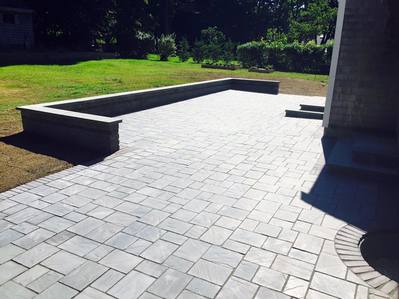 A hardscape patio that's installed using pavers or similar natural stones provides an attractive outdoor space that's incredibly low-maintenance and suitable for any climate. If you're thinking of hiring a professional landscaper to install a paver patio, you should know what questions to ask the contractor. Minor errors can result in major losses, from unpleasant appearances to serious drainage issues. It's worth taking the time to research and compare contractors to ensure you're hiring someone who is an experienced expert in paver patio installation. A reputable landscaping contractor will:
A few questions you may want to ask a landscape contractor before having them install you patio are: 1. Are you licensed and insured? Massachusetts does require professional landscape contractors to have an active license to perform work. Your contractor should also carry liability insurance and, if it has employees, worker’s compensation insurance. If not, you could be responsible for paying for damages a contractor causes to your property or to him or herself or employees. When you meet with a landscape contractor, ask to see their license and proof of insurance. 2. Do you provide a quote? Of course you want to know how much a paver patio installation will likely cost. Your landscape contractor should be able to provide you with a quote for the job, not just a price range. 3. Do you offer a contract? Most professionals are willing to include the scope of the work in writing right along with your quote. If they don't do this, ask them to. While a verbal agreement may work fine in many cases, it's always better to get it in writing or look for a different contractor. 4. Can you provide a timeline? A good landscaper will inform you of the start date and time for your job. They should also let you know what time to expect the crew each day and how many days it'll take to complete the job. 5. Can you provide 3 - 5 referrals? An experienced contractor will gladly supply you with the names and phone numbers of past customers so you can verify their work. You can also ask to visit a site where the contractor installed a similar paver patio and ask to talk with that homeowner about their experience with the contractor. If a contractor is reluctant to give you referrals, there's probably a reason. 6. How will you execute the installation of my paver patio? A landscape contractor can explain to you the plan to prepare the patio base; discuss the material options that can be used; explain the compaction process, as well as drainage factors. An experienced landscaper can also explain the pros and cons of certain materials and help you select what works best to meet your style choices as well as your budget.
6 Comments
Lawn weeds are one of the primary concerns we hear from customers throughout the spring and summer. We are starting to get asked those questions, "Why do I get chickweeds?" "Is this a weed?" and "How do we get rid of dandelions for good?" Weed seeds are carried far and wide, so even if you had your lawn looking pristine last year, you may be wondering why there is white clover or dandelions in your turf. Wind, birds, lawn tools and even your mower can carry weed seeds. The soil itself likely has weed seeds in it, which can last for 50 years or more! Now that the warmer weather has arrived in Massachusetts, chances are, you've started to see weeds on your property. Some of the common weeds we see are: 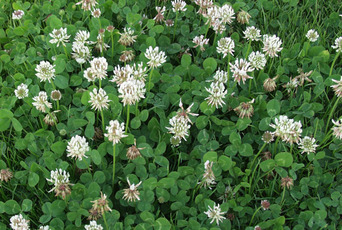 1. White clover (also called Dutch clover). At one time this was actually a common ingredient in grass seed blends. Although it does look like a small, sweet flower, most regard it as an undesirable weed in the lawn. Low nitrogen and poor soil conditions tend to result in white clover patches. You can dig patches of these up and then apply fertilizer to those spots. Often though, fertilizing your lawn can help to get rid of this weed. Apply several seasonal broadleaf herbicide and fertilizer applications for best results. 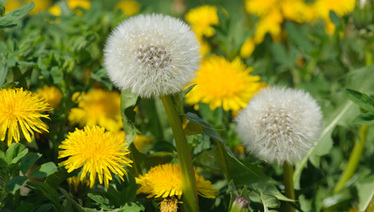 2. Dandelion. Taraxacum officinale, more commonly known as a dandelion, is a perennial weed that grows long taproots. When they do pop up, it's best to dig them by hand, getting the entire taproot out (or it can resprout, yielding two plants!) If you don't remove dandelions they will release new seeds that can take root making a small weed problem a big problem. Maintaining a thick, healthy lawn is the best defense against wind-blown dandelion weed seeds’s taking root. You can also spot-spray with a post-emergence herbicide that doesn’t kill your grass. 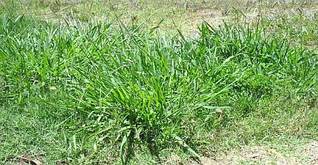 3. Crabgrass. This annual weed tends to appear in weak or bare areas of a lawn. Over-watering as well as under-watering can contribute to bare sports and growth of crabgrass. Continually mowing your lawn too short can also contribute to its growth. It's best to treat crabgrass in the spring with a pre-emergent herbicide to keep seeds from sprouting. 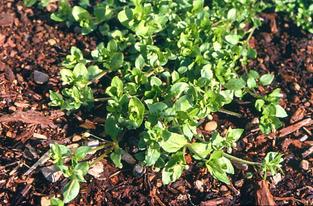 4. Chickweed. Although its seeds can sprout in dry soil, chickweed is an annual weed that tends to prefer shady, moist soil. It often appears in lawns that are thin and/or have poor drainage. Pulling out individual weed plants is the best and easiest method to control chickweed. If you know from previous years that you tend to get dense patched of chickweed, you may want to use a pre-emergent herbicide in early spring to prevent seeds from germinating. 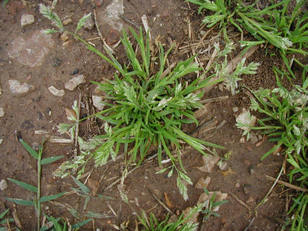 5. Annual bluegrass. Annual bluegrass, as the name indicates is an annual weed. While it looks like grass and can even blend in alright with fescue lawns, it does stand out in other lawns. You often see annual bluegrass pop up in late summer where soil drains poorly or the lawn has been over-watered. A pre-emergent herbicide application in spring or early summer can prevent seed germination. If you have annual bluegrass, and/or chickweed, consider aerating your lawn to improve soil drainage. If you have questions about weeds or you're interested in an herbicide and/or fertilizer application, give us a call at Gardenin' Angels: 774-284-1171. |
Archives
February 2024
AuthorRodrigo Dos Anjos Categories
All
|
Gardenin' Angels, Landscape Management & Construction
A preferred landscaper, serving Southeastern Massachusetts
11 Renker Drive, Easton, MA 02375
774-284-1171
[email protected]
Privacy Policy • Terms of Use

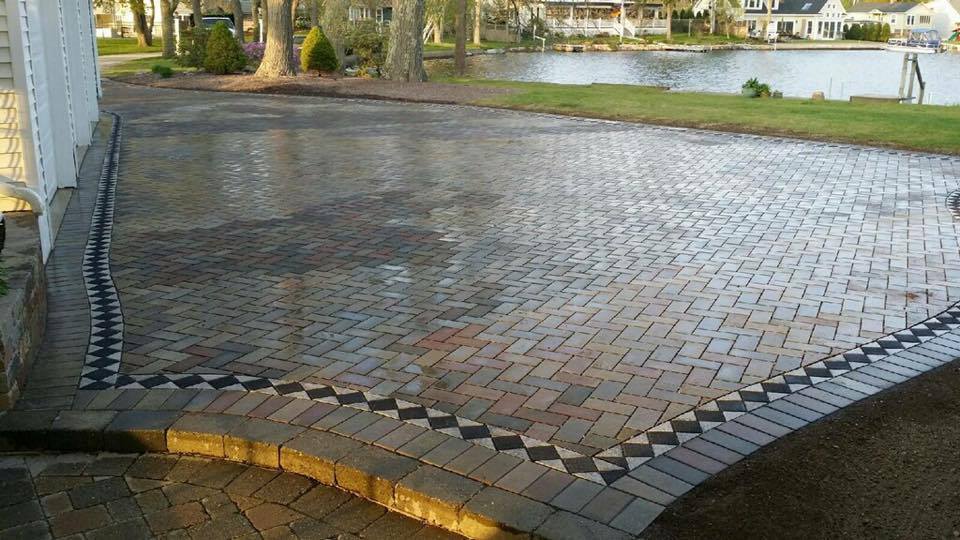
 RSS Feed
RSS Feed